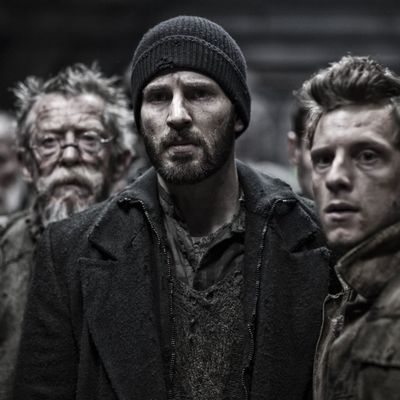
O dystopia, you have o’erwhelmed our imaginations, transformed our cinemas into charnel houses, our movies into nihilistic dirges. We drink in your ecocatastrophes, your post-apocalyptic death matches, your blood-soaked chasms between haves and have-nots. Now, at last, comes a fun dystopian sci-fi epic — a splattery shambles with a fat dose of social satire and barely a lick of sense. It’s Bong Joon-ho’s Snowpiercer, which must be seen to be disbelieved.
The South Korean director’s first English-language film is based on a good French graphic novel called Le Transperceneige and set on a long, long, long train, which carries the frozen Earth’s only survivors after an attempt to stop global warming has backfired spectacularly. The problem is that the population is cruelly subdivided. The fatted Richie Riches lead lives of luxury in the front half of the train, where they pay homage in speech and song — much as North Koreans were forced to sing “No Motherland Without You” to their Supreme Leader — to the “Eternal Engine” and its inventor, Wilford, whom few have ever seen. But you don’t want to be stuck in the back, where the ragged denizens — many missing limbs — have only protein mush to eat, and where they have to watch helplessly as, seemingly at random, soldiers drag off their children.
Snowpiercer centers on a steerage-class revolt led by Curtis (Chris Evans), his pal Edgar (Jamie Bell), and proles played by, among others, John Hurt, as Curtis’s one-legged mentor; Octavia Spencer, as a woman whose son has been plucked from her; and Ewen Bremner, as a father who gets out of line and has his right arm thrust out a train window, frozen solid, and shattered by soldiers with large hammers. Kang-ho Song (from Bong’s great giant monster picture The Host) is a cryptic engineer whose daughter is his only confidante. The rebels’ destination: the Eternal Engine. But first they have to get past a lot of soldiers, bolted steel doors, and an especially vicious enforcer, Franco the Elder (Vlad Ivanov, the Romanian abortionist in 4 Months, 3 Weeks and 2 Days).
The action scenes are choppy and gracelessly staged, and many of the actors high on the hog. But the combination of B-movie tackiness and broad satire is strangely potent. There’s a touch of John Carpenter about Snowpiercer; it has the straight-ahead, no-nonsense drive of They Live. And as the rebels push through more and more surreal settings and good souls falling by the wayside — shot, stabbed, disemboweled — the film is like a stoned leftist’s version of The Poseidon Adventure. Bong uses few sideways shots. He’s either in front of the rebels as they barrel into the frame or behind them as they move towards ever more lethal obstacles. The exception is a beaut: a gunfight between Curtis and Franco the Elder in different sections of the train as it rounds an immense curve.
Ed Harris plays Wilford and is, I’m afraid, irredeemably hammy: He made me appreciate Brando in Apocalypse Now, and Brando’s Kurtz is a travesty. My guess is that the non-Korean actors were on their own. Alison Pill has a gloriously over-the-top scene as a very pregnant schoolteacher, a chirpy propagandist for the Eternal Engine. But the sole note of transcendence is struck by (a barely recognizable) Tilda Swinton as a snaggletoothed quasi-headmistress with high airs and middle-class nasality. Bong shoots her like an Eisenstein counter-revolutionary — a Fascist duck. Swinton and the character deserve their own movie. She’s a one-woman dystopia.
*This is an extended version of an article that appeared in the June 16, 2014 issue of New York Magazine.


